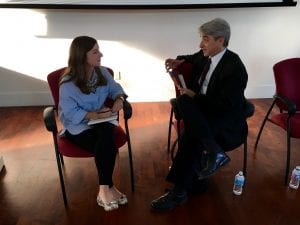
Since the turn of the 21st century, technology has allowed political news to spread further, faster, and to an expanding audience. However, this appears to have had no impact on the level of interest that this audience takes with political news. With every election season, the people voting seem to stay uninformed. In his lecture at the Tower Center Sept. 21, Dr. Arthur Lupia, author of “Uninformed: Why People Seem to Know So Little about Politics and What We Can Do about It,”addressed this concern in the form of four specific questions: 1) Why are so few voters informed; 2) How much does a voter need to know; 3) How do voters learn this information; and 4) Should we be cynical?
Lupia argued that it is not the voters’ job to be informed. Instead, it is up to the informers to communicate information to the voters despite the reality of media overload — they need to be more interesting than cat videos.
Why are so few voters informed?
The answer to this question was simple: We are all uninformed. Although experts may have far greater experience in the political field than the average voter, no one on earth could ever have every piece of political knowledge to make a completely informed decision. As an example, Lupia asked if anyone had read through every single law that was passed by Congress this past year, which on average is roughly 200 laws. No one raised their hand. “There are two groups of voters,” Lupia said. “Those that know that they can’t know everything, and those that are delusional about how much they know about politics.”
How much does a voter need to know?
According to Lupia, how much a voter needs to know depends on the person. “How much should I eat?” he asked. “The answer varies if you’re a marathoner or a baby.” Most people vote for what is most consistent with their values. Identifying with a political party can simplify the decision-making process. It acts as a cue, or a practical shortcut answer to achieve an ultimate goal. Voters can use their party affiliation as a brand name and trust that they are voting for what aligns with their values without being familiar every piece of legislation in D.C.
How do voters learn?
When it comes to attention span, humans only have room in their minds to think about seven plus-or-minus two “chunks” at a time. That means “when you’re trying to talk to someone about politics, there are only seven plus-or-minus two parking spaces,” he said. Not only that, but politicians are now competing with hundreds, if not thousands, of other forms of entertainment on mass media today—like cat videos — for those parking spaces. Because of this, Lupia argued that it is important for political experts to make their messages urgent, simple, and direct.
He offered the Remain camp in the Brexit campaign as an example of how this message idea failed. The slogan of the Leave campaign was “We send the EU 350 million pounds a week. Let’s fund our NHS instead.” The Remain slogan was “Britain stronger in Europe.” Lupia argued this slogan was obscure and ineffective compared to the Leave slogan: “What does it mean, and can I eat it?” he said. Even by using the term “Brexit,” Lupia said the Remain campaign was feeding into the urgent, seemingly simple solution that the Leave campaign was offering.
It is up to the experts, not the voters, to listen to their audience and see the audience on their own terms. They will never be able to communicate political news to voters if they cannot figure out what the voters care about, and then spend time crafting a simple, direct message.
Should We Be Cynical?
Lupia’s answer to this last question was yes and no. “Politics is people. It’s your choice,” he said. He believes voters can affect their classrooms, offices, communities, and cities by choosing to communicate effectively about politics. So whether or not we should be cynical about the future of political information sharing depends on who’s making that choice, and how involved they want to be.
My takeaway
I would argue that Lupia’s points are just as relevant to university professors, corporate sales people, or presenters across all professions. In my interview with Lupia before his presentation, he described his class environment at the University of Michigan. Throughout the semester, Lupia and his students discuss political issues. On the board, Lupia displays a map of the classroom, and students stand in the area that pertains to their beliefs on an issue. For their final exam, students choose one of those topics, stand at the front of the room, and change their classmates’ minds. Lupia said the key to changing their minds, just like changing voters’ minds, is “focusing on the the students and changing a presentation so that it is useful” to the audience so that “they hear their story.”
Listen to Dr. Arthur Lupia’s lecture:
 Madeleine Case is a SMU junior from Dallas majoring in English and international studies with a minor in mathematics. She is a President’s Scholar, SMU Ambassador, and is currently working with Dr. Hiroki Takeuchi as a Hamilton Scholar researching comparative authoritarianism in state-society relations.
Madeleine Case is a SMU junior from Dallas majoring in English and international studies with a minor in mathematics. She is a President’s Scholar, SMU Ambassador, and is currently working with Dr. Hiroki Takeuchi as a Hamilton Scholar researching comparative authoritarianism in state-society relations.